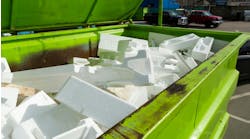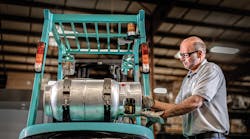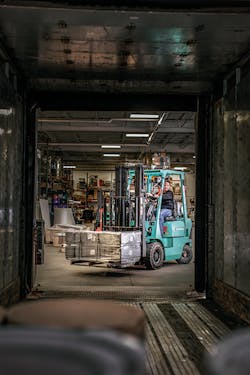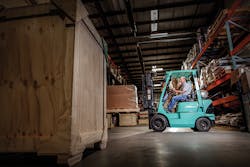When it comes to choosing a fuel for forklifts, propane prevails.
According to data from the Propane Education & Research Council, more than 90% of Class 4 and 5 operators are using forklifts powered by propane for a variety of reasons. The majority of fleet managers opt for propane, too. In fact, 70% of fleet managers in the middleweight class of forklifts (5,000 to 10,000 lb.) and 51% of fleet managers in the heavyweight class (10,000 lb. or more) choose propane over gas or diesel.
The last thing a manager or operator wants to worry about is if their forklift is going to perform when called upon. For this reason, choosing the best forklift — and its fuel — is an integral part of a facility’s operation.
Facility managers across the country are choosing propane because they know that when it comes to keeping productivity up and costs down, propane can do that. Propane also enhances safety and performance, while reducing emissions.
Here are four things to consider when selecting a facility’s next forklift:
- Propane-powered forklifts are safe.
Ask any facility manager what their number one job is every day they will say keeping their employees safe. That commitment to safety even boils down to the type of equipment used within the facility.
Due to the nature of the equipment, forklifts — and other heavy machinery — introduce some risks. That said, the choice of power source does make a difference and propane helps circumvent some potential workplace hazards for employees.
For example, propane forklift operators can avoid electrical hazards from the daily use of recharging equipment for electric forklifts, hazardous spills from gasoline- and diesel-fueled equipment, or chemical spills from lead-acid battery-powered forklifts. And rather than swapping out heavy batteries from a recharging rack, employees enjoy simple refueling because 33-pound propane cylinders are ready to go from a storage cage.
- Clean emissions profile.
Propane has a stellar reputation for its reliability and versatility in material handling operations, but some are surprised to learn that it has an edge over electric when it comes to emissions, too.
Electric forklifts produce zero emissions during normal operation, but when considering the total site-to-source emissions required for bringing electric forklifts to market, its emission profile isn’t as clean as many may think. Site-to-source emissions include those produced in the manufacturing and transportation of batteries for electric forklifts. Propane, compared with the site-to-source emissions of electric, produce 76% fewer SOx emissions. Compared with gasoline, propane forklifts reduce SOx emissions by 15 percent, NOx emissions by 17%, and greenhouse gas emissions by 16%.
Because propane equipment operates so cleanly, it can be used indoors and out. Many businesses actually choose propane for its low-emissions indoor performance. As long as the engines have been properly serviced and they’re in a well-ventilated environment, propane forklifts are perfectly suited to operate indoors.
- What you see is what you get.
Specifying the right forklift for a facility’s operational needs is mission critical. Don’t fall into the one-size-fits-all mindset that electric is the only option, which is a common industry misconception.
New propane forklifts are reliable, powerful, efficient, and affordable. Plus, they’re able to work in virtually all areas of warehousing and material handling applications. Best of all, what you see is what you get, meaning propane forklifts don’t come with hidden costs like other fuels. Propane forklifts are less expensive at acquisition than electric, while Tier-4 requirements can add thousands of dollars to the purchase price of diesel equipment. Electric forklifts are costly when you consider the utility costs of keeping them charged. Battery life and power output for electric forklifts also diminish over time and lead to future costs that can go overlooked, including additional expensive batteries.
An investment in propane cylinders and storage cages, on the other hand, can last decades. Beyond the initial equipment purchase and cost of fuel, companies are only responsible for buying and storing the cylinders, which can last up to 27 years — about three times as long as the average forklift battery.
In addition to monetary savings, facilities can also steer clear of hazards pertaining to chemical spills from battery acid and the disposal of used batteries. Further, employees won’t have to worry about battery mismanagement halting their productivity. Instead of requiring an overnight battery charge to hit the ground running in the morning, employees can simply swap out an empty propane cylinder for a full one, which takes less than a minute, to keep material moving. Propane forklifts provide 100% power throughout operation to make the most of the work day, and one cylinder covers an entire eight-hour shift.
- Propane is a local fuel.
According to the Department of Energy, more than 90% of U.S. propane supplies are produced in the United States. As a versatile alternative fuel, propane is already being used by millions of Americans for transportation, commercial, industrial, and agricultural applications.
Propane is a clean, American-made fuel that keeps quality jobs in the U.S. As of 2012, more than 145,000 workers across the country are employed in propane trade, wholesale, and sales. By incorporating propane into a plant or facility’s fleet, the company is indirectly helping out another small business in its local community. Local fuel suppliers have customers’ best interests in mind. They are a part of the same community and could even be a neighbor who lives close by.
It’s easy to see why warehouse and facility managers across the country are choosing propane forklifts to give their operations a lift. Whether it be keeping employees safe on a daily basis, reducing emissions, or increasing productivity, propane can help facilities get more done safely.
Learn more about propane forklifts at Propane.com/Forklifts.












